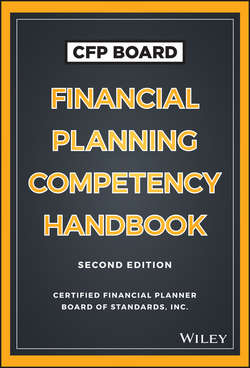Читать книгу CFP Board Financial Planning Competency Handbook - Board CFP - Страница 41
На сайте Литреса книга снята с продажи.
PART One
Introduction
CHAPTER 6
Financial Planning Process
LEARNING OBJECTIVES
ОглавлениеThe student will be able to:
a. Describe the personal financial planning process as defined by the Financial Planning Practice Standards.
b. Recognize unethical practices in the financial planning profession based on the CFP Board Standards of Professional Conduct.
Rationale
Financial planners should be proficient in explaining, documenting, and diagramming the financial planning process. The financial planning process, as defined by CFP Board, can be diagramed in a number of ways. Consider the example presented in Figure 6.1. The illustration shows how the process begins by establishing and defining the client–planner relationship and ends with monitoring tasks. It is important to note that this process is cyclical, and feedback from each step informs the ongoing planning process and client–planner relationship.
Figure 6.1 The Systematic Financial Planning Process
The diagram shown in Figure 6.1 illustrates the sequence of logical, organized steps that a personal financial planner follows when working with clients to develop a comprehensive financial plan. Each step in the process flows seamlessly to the ensuing step; this process ensures that nothing is inadvertently overlooked that might result in a less than optimal client experience. Personal financial planning is extremely detail-oriented, and it entails gathering and interpreting information of a sensitive and confidential nature. Clients seek assurance that this information will be handled with discretion and with proper regard for recommendations that will ultimately be made.
Financial planning shares practice requirements that are unique among established professional endeavors in that practitioners must abide by various professional, local, state, and federal rules, regulations, and ethical guidelines. The wide variety of regulatory oversight, and sometimes conflicting ethical standards, has often been justified as a way to protect the consumer interest. Increasingly, however, many financial planners have adopted Certified Financial Planner Board of Standards, Inc. Standards of Professional Conduct to guide their interactions with clients.44 The Standards provide guidance on: (1) the material elements of the financial planning process, (2) obligations owed to prospective clients, (3) disclosure obligations, (4) the use of written agreements, (5) compensation disclosure, (6) obligations to the profession and other professionals, and (7) standards of care. CFP Board’s Code of Ethics and Professional Responsibility outlines principles that are aspirational and a source of guidance for CFP® practitioners.45 These include integrity, objectivity, competence, fairness, confidentiality, professionalism, and diligence. CFP® professionals are expected to both know these principles and be able to apply them in their practice.
In summary, ethical guidelines represent the basis on which the personal financial planning profession exists. Clients expect not only that financial planners are technically proficient in all facets of personal financial planning, but that they will always place the client’s interests above everything and everyone else. Merely the appearance of impropriety or lack of objectivity can trigger a loss of confidence in the client’s immediate situation as well as the overall profession. Clients seek professionals who will be advocates for meeting their goals and objectives without distraction or other consideration. A personal financial planner should always be mindful of situations and circumstances that could potentially result in a loss of objectivity and impartiality.
Related Content Areas Associated with the Learning Objectives
■ The function and purpose of fully understanding the process of financial planning is to help frame the client–planner alliance.
■ Ethical standards serve as a guide for planners before, during, and after services are provided to clients.
Ethical rules and regulations provide a working framework for financial planners when building a business model.
44
www.cfp.net/for-cfp-professionals/professional-standards-enforcement/standards-of-professional-conduct/financial-planning-practice-standards.
45
Ibid.
